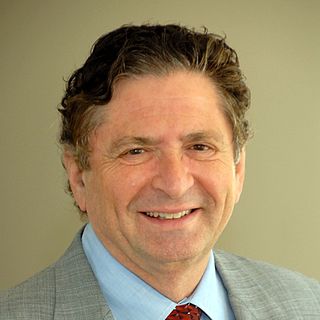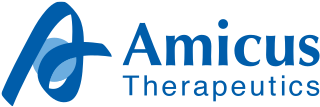
Christopher Charles John is an American politician and lobbyist who from 1997 to 2005 served as a Democratic member of the United States House of Representatives for Louisiana's 7th congressional district, since disbanded and merged into the 3rd district.
Sanofi S.A. is a French multinational pharmaceutical and healthcare company headquartered in Paris, France. Originally, the corporation was established in 1973 and merged with Synthélabo in 1999 to form Sanofi-Synthélabo. In 2004, Sanofi-Synthélabo merged with Aventis and renamed to Sanofi-Aventis, which were each the product of several previous mergers. It changed its name back to Sanofi in May 2011. The company is a component of the Euro Stoxx 50 stock market index.

Glycogen storage disease type II, also called Pompe disease, and formerly known as GSD-IIa. It is an autosomal recessive metabolic disorder which damages muscle and nerve cells throughout the body. It is caused by an accumulation of glycogen in the lysosome due to deficiency of the lysosomal acid alpha-glucosidase enzyme. GSD-II and Danon disease are the only glycogen storage diseases with a defect in lysosomal metabolism, and Pompe disease was the first glycogen storage disease to be identified, in 1932 by the Dutch pathologist J. C. Pompe.

Notre Dame Law School is the professional graduate law school of the University of Notre Dame. Established in 1869, it is the oldest continuously operating Catholic law school in the United States.
BioMarin Pharmaceutical Inc. is an American biotechnology company headquartered in San Rafael, California. It has offices and facilities in the United States, South America, Asia, and Europe. BioMarin's core business and research is in enzyme replacement therapies (ERTs). BioMarin was the first company to provide therapeutics for mucopolysaccharidosis type I, by manufacturing laronidase. BioMarin was also the first company to provide therapeutics for phenylketonuria (PKU).

Genzyme was an American biotechnology company based in Cambridge, Massachusetts. Since its acquisition in 2011, Genzyme has been a fully owned subsidiary of Sanofi. In 2010, Genzyme was the world's third-largest biotechnology company, employing more than 11,000 people around the world. As a subsidiary of Sanofi, Genzyme has a presence in approximately 65 countries, including 17 manufacturing facilities and 9 genetic-testing laboratories. Its products are also sold in 90 countries. In 2007, Genzyme generated $3.8 billion in revenue with more than 25 products on the market. In 2006 and 2007, Genzyme was named one of Fortune magazine’s “100 Best Companies to Work for”. The company donated $83 million worth of products worldwide; in 2006, it made $11 million in cash donations. In 2005, Genzyme was awarded the National Medal of Technology, the highest level of honor awarded by the president of the United States to America's leading innovators. In February 2022, Sanofi's new corporate brand was unveiled and former entity "Sanofi Genzyme" got integrated into Sanofi.
Sheridan Gray Snyder OBE is an entrepreneur, venture capitalist, and philanthropist in the biotechnology industry. He is the founder and CEO of Biocatalyst, Genzyme and others.

Michael James Astrue is an American lawyer and, under the pen name A. M. Juster, a poet and critic. He served as Commissioner of the Social Security Administration from 2007 to 2013. Astrue was Poetry Editor of First Things from 2018 to 2020, and became Poetry Editor of Plough Quarterly in 2020.

Ivor Royston is an American oncologist, researcher, scientist, entrepreneur and venture capitalist, recognized for his efforts to develop treatments for multiple disease targets and to fund biotechnology companies with promising science, technology or medicines. He speaks regularly at healthcare conferences and symposia throughout the United States, Europe and Asia.

The National Organization for Rare Disorders (NORD) is an American non-profit organization aiming to provide support for individuals with rare diseases by advocating and funding research, education, and networking among service providers. It was founded in 1983 by Abbey Meyers, along with individuals and rare diseases leaders of rare disease support groups, and it is a 501(c)(3) tax exempt organization.

Extraordinary Measures is a 2010 American medical drama film starring Brendan Fraser, Harrison Ford, and Keri Russell. It was the first film produced by CBS Films, the film division of CBS Corporation, who released the film on January 22, 2010. The film is about parents who form a biotechnology company to develop a drug to save the lives of their children, who have a life-threatening disease. The film is based on the true story of John and Aileen Crowley, whose children have Pompe's disease. The film was shot in St. Paul, Oregon; Portland, Oregon; Tualatin, Oregon; Wilsonville, Oregon; Manzanita, Oregon; Beaverton, Oregon, and Vancouver, Washington.

Santiago Schnell FRSB FRSC is a scientist and academic leader, currently serving as the William K. Warren Foundation Dean of the College of Science at the University of Notre Dame, as well as a professor in the Department of Biological Sciences, and Department of Applied and Computational Mathematics and Statistics.
William Canfield is a glycobiologist, chief scientific officer and founder of an Oklahoma City-based biotechnology company, Novazyme, which was acquired by Genzyme in August 2001 and developed, among other things, an enzyme that can stabilize Pompe disease, based on Canfield's ongoing research since 1998. Canfield subsequently left Genzyme and established, with his partner in the Novazyme operation, John Crowley, another research laboratory, which he still heads. He saved Cytovance from bankruptcy by forming an investor group and raising $9 million after Crowley suddenly left the lab in 2005 to become the chief executive officer at Amicus Therapeutics in New Jersey
Alnylam Pharmaceuticals, Inc. is an American biopharmaceutical company focused on the discovery, development and commercialization of RNA interference (RNAi) therapeutics for genetically defined diseases. The company was founded in 2002 and is headquartered in Cambridge, Massachusetts. In 2016, Forbes included the company on its "100 Most Innovative Growth Companies" list.

Amicus Therapeutics is a public American biopharmaceutical company based in Philadelphia, PA. The company went public in 2007 under the NASDAQ trading symbol FOLD. This followed a 2006 planned offering and subsequent withdrawal, which would have established the trading symbol as AMTX Prior to their IPO, Amicus was funded by a variety of venture capital firms including Radius Ventures, Canaan Partners and New Enterprise Associates.

Henri A. Termeer was a Dutch biotechnology executive and entrepreneur who is considered a pioneer in corporate strategy in the biotechnology industry for his tenure as CEO at Genzyme. Termeer created a business model adopted by many others in the biotech industry by garnering steep prices— mainly from insurers and government payers— for therapies for rare genetic disorders known as orphan diseases that mainly affect children. Genzyme uses biological processes to manufacture drugs that are not easily copied by generic-drug makers. The drugs are also protected by orphan drug acts in various countries which provides extensive protection from competition and ensures coverage by publicly funded insurers. As CEO of Genzyme from 1981 to 2011, he developed corporate strategies for growth including optimizing institutional embeddedness nurturing vast networks of influential groups and clusters: doctors, private equity, patient-groups, insurance, healthcare umbrella organizations, state and local government, and alumni. Termeer was "connected to 311 board members in 17 different organizations across 20 different industries" He has the legacy of being the "longest-serving CEO in the biotechnology industry.

Ionis Pharmaceuticals, Inc. is a biotechnology company based in Carlsbad, California, that specializes in discovering and developing RNA-targeted therapeutics. The company has 3 commercially approved medicines: Spinraza (Nusinersen), Tegsedi (Inotersen), and Waylivra (Volanesorsen) and has 4 drugs in pivotal studies: tominersen for Huntington’s disease, tofersen for SOD1-ALS, AKCEA-APO(a)-LRx for cardiovascular disease, and AKCEA-TTR-LRx for all forms of TTR amyloidosis.

Nancy A. Thornberry is the founding CEO and current chair, R&D at Kallyope Inc. in New York City. She previously worked with Merck Research Laboratories (MRL), joining the company in 1979 as a biochemist and retiring from the position of senior vice president and franchise head, diabetes and endocrinology in 2013.

ProQR Therapeutics NV is a Dutch biotechnology company based in Leiden, the Netherlands, with a presence in Cambridge, Massachusetts, US. The company was funded in 2012 by chief executive officer (CEO) Daniel A. de Boer. It specializes in the development of RNA therapeutics using its RNA editing platform technology called Axiomer.
John Maraganore is an American scientist, entrepreneur, and life sciences industry leader.














